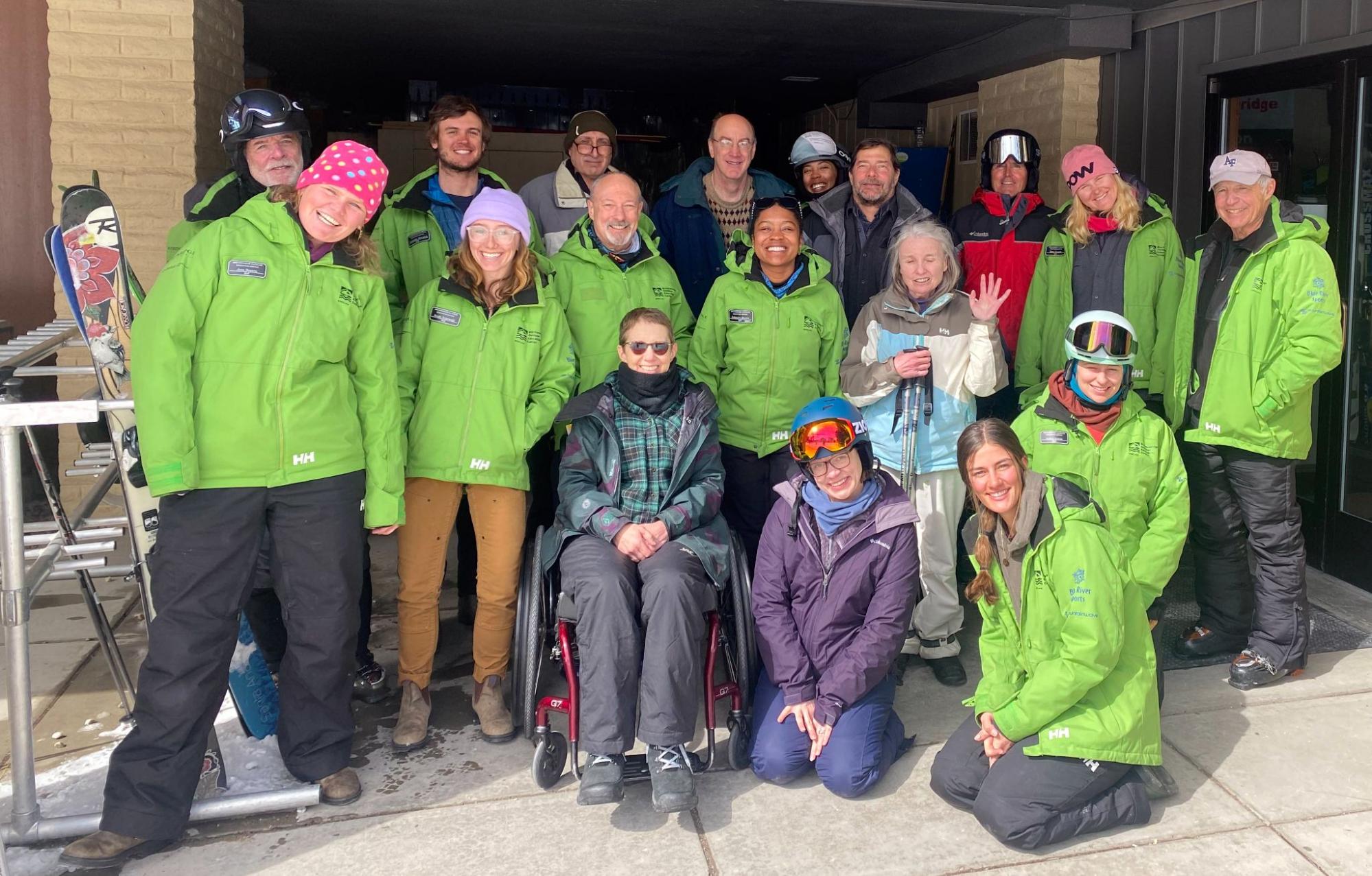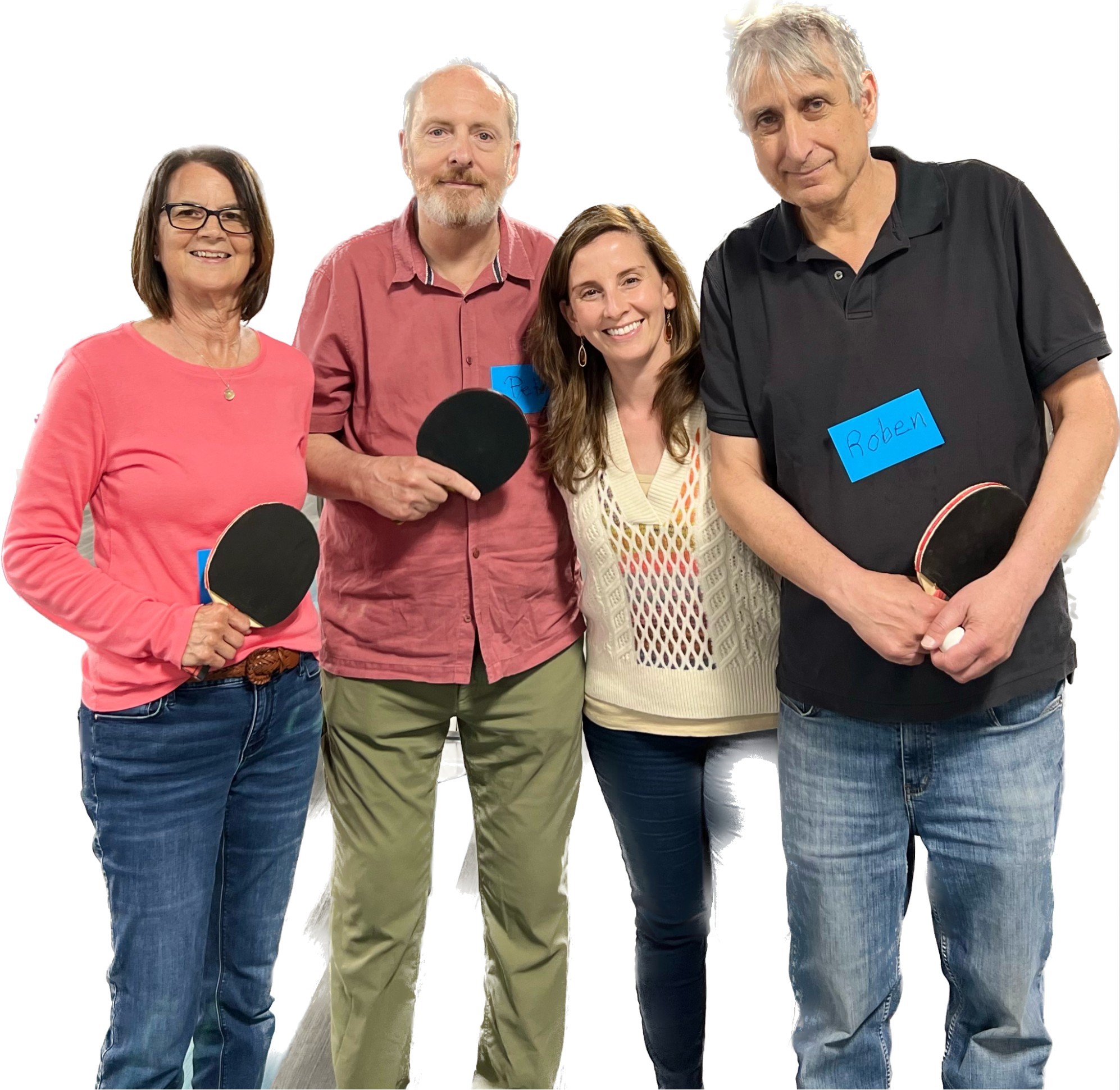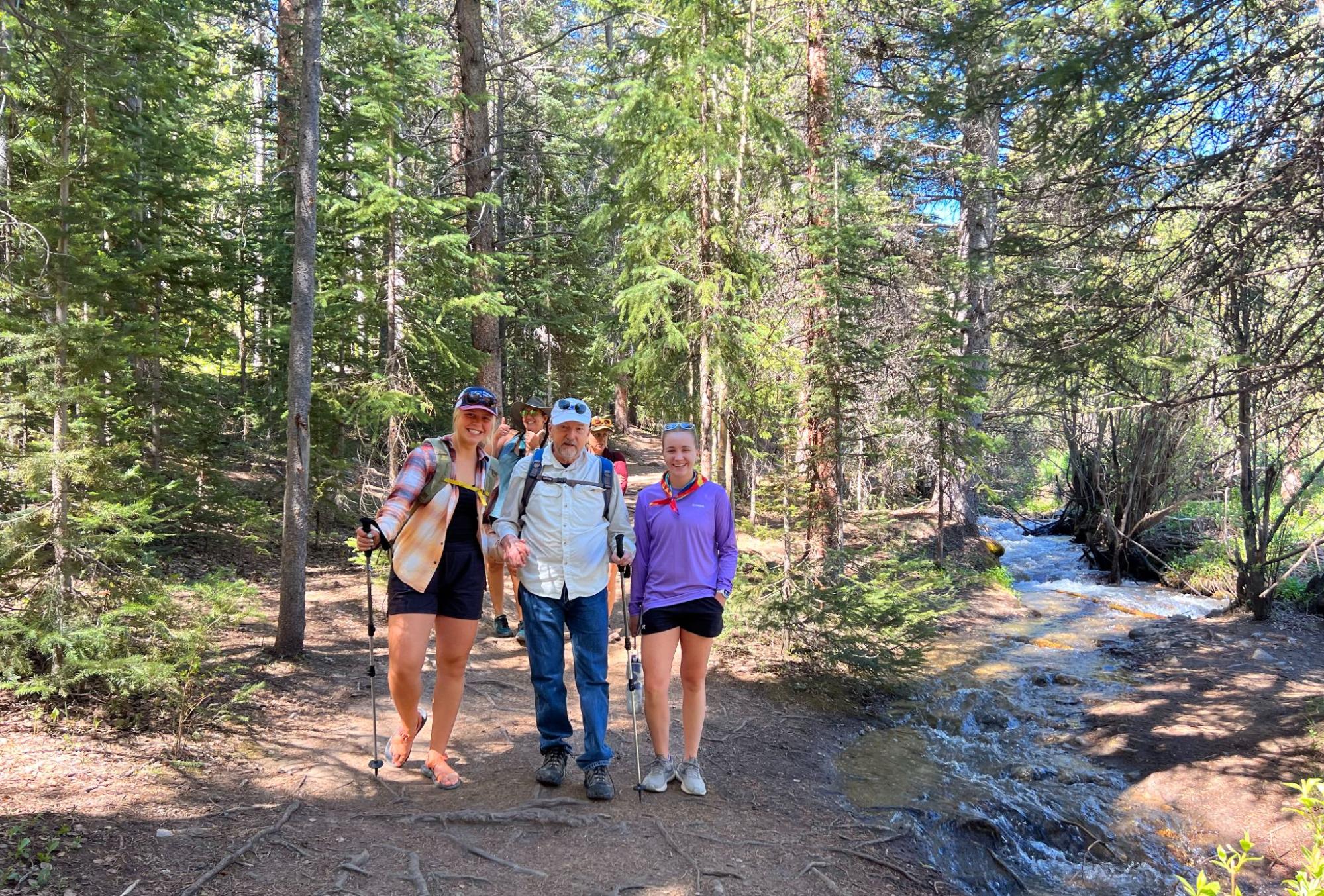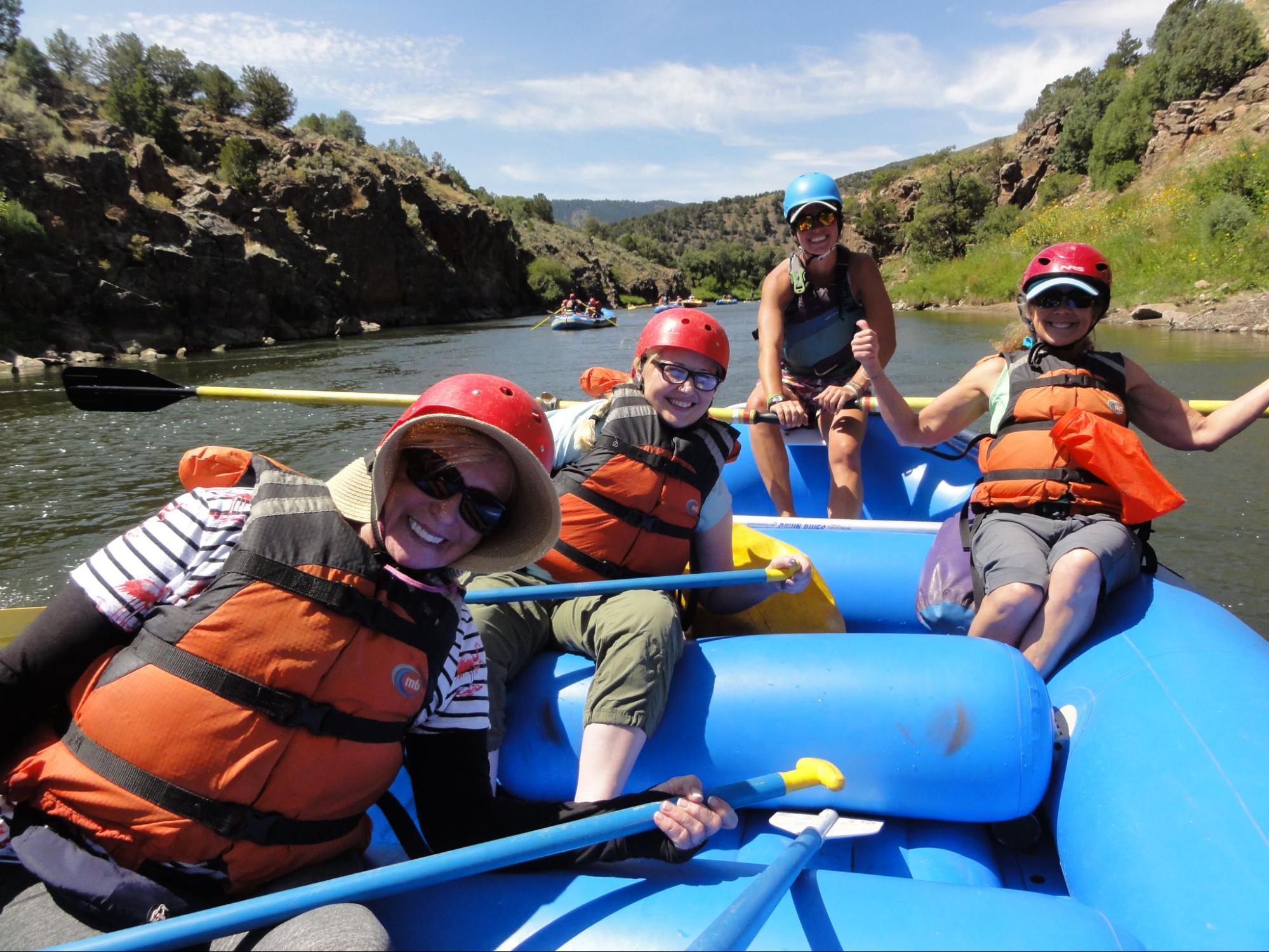
Roben Seltzer (third from the left in the back row) with BOEC Winter 2023 Outdoor Adventures Within.
Prior to developing Parkinson’s disease, Roben led a rather conventional life in a suburban area situated approximately 30 miles north of New York City. He spent his time helping to raise his two sons and was actively involved in his community.. Roben coached soccer and served on the board of a school catering to special needs children, showing his commitment to making a difference in the lives of others. Living within close proximity to excellent hiking trails, he seized every opportunity to immerse himself in the great outdoors. Alongside his adventurous pursuits, Roben raised a very large, recalcitrant Airedale terrier named Otto, admitting, “I forgave everything he did though I really shouldn’t have.”
As Roben’s sons grew older, he introduced them to the exhilaration of alpine skiing. They began skiing in the picturesque Berkshires of Massachusetts before venturing further west to destinations like Colorado, Utah, and California’s Tahoe region. March became an eagerly anticipated month for their annual ski trips. While Roben had taken up skiing in his late twenties, he had reached a level of proficiency on double blue slopes without venturing further. Nevertheless, he loved the sport for its beauty, challenges, and the general fun it brought to him and his sons both on and off the mountain.
Approximately five years ago, Parkinson’s disease entered Roben’s life in a profound way. Although formally diagnosed in 2019, he initially adopted a “wait and see” approach towards medication, a common mindset among many people living with this disease. Over the prior ten years he had already stopped cycling, getting up on ladders, and tackling hikes with sheer drops. Roben recalls an experience from that time this way, “I had last tried to ski on a trip to Tahoe in 2017 but couldn’t move as my legs trembled uncontrollably. I wasn’t sure why. Now I, of course, understand.”
Unacknowledged and untreated, Parkinson’s disease, which appears in a wide variety of subtypes, can wreak havoc on a person’s life which unfortunately was true in Roben’s case. When he reached the doorstep of Dr. Elana Clar of New Jersey Brain and Spine, one of the most highly trained neurologists in the nation, he had lost the ability to drive, shed 70 pounds, and relinquished all hopes of returning to the trails he enjoyed.
Parkinson’s is a disease that slows and stiffens the body making exercise the antithesis of the disease. As a physician with a creative approach to treatment, Dr. Clar co-founded the second chapter of Ping Pong Parkinson in the United States. Given the profound results that have come from Parkinson’s sufferers engaging in frequent exercise, Dr. Clar recognized ping pong as a good way to help her patients, including Roben, improve both physical and cognitive symptoms and help coordination. Studies show that frequent exercise not only improves symptoms but also can positively impact the progression of this disease, slowing or halting progression by waking up one’s muscles and increasing longevity of one’s cells. Dr. Clar recommends both medication and exercise for best results.
Ping Pong Parkinson New Jersey, hosts weekly classes bringing together “pongers”, individuals with Parkinson’s disease and volunteers or “hitters”, without Parkinson’s disease, to play with the “pongers”. The volunteers that participate cover a range of abilities and ages. Often college tennis athletes volunteer with Parkinson’s participants encouraging growth and improvement of all players. The rotation of people a “ponger” plays against changes adding spontaneity, engagement, and communication which helps develop new relationships. Occurring in a large hall with many tables, one must speak loudly to communicate and since the speech of those with Parkinson’s starts to soften and slur, this is a type of speech therapy. Playing ping pong also reduces apathy and introversion that results from disease progression. The original chapter of this organization, founded in New York, promotes singing and speech goals to help with therapy and is a possible future focus for this chapter. Many aspects of these activities can help those with Parkinson’s.
One of Dr. Clar’s favorite memories is witnessing someone in their 80s playing an 8-year-old and seeing elders taking advice from young players. She explains that this is an excellent way for people to engage in a meaningful new hobby or activity as a family or individual, looking to give back to their community and build friendships and relationships away from screens and technology.

Dedicated pongers Jan and Peter, Dr. Clar and Roben.
Engaging actively in his local Parkinson’s support group, Roben recognized the significant impact of carbidopa levodopa medication and physical therapy in setting him on a path to “recovery.” However, he firmly believes that ping pong has played a pivotal role in his journey. In fact, Roben has his future sights set on the Ping Pong Parkinson international competition. “Ping pong brought me renewed physical balance, stamina and fluidity,” he explains “but it also delivered psychic rewards in the form of a persistent desire for experimentation and new adventure. These attitudes plus a “new seize the day” outlook brought me to BOEC.”
A remarkable transformation awaited Roben. After connecting with Dr. Clar, and joining Ping Pong Parkinson he gradually regained the ability to drive, albeit facing challenges when parking within the lines. Over time, Dr. Clar has seen Roben improve in certain aspects of physical mobility and with his reflexes giving him the courage to try skiing again. He resumed his passion for hiking and even dared to dream of foreign travel once more.
In February, Roben traveled to Colorado to take part in the BOEC’s Outdoor Adventures Within program, an alpine ski retreat for adults living with multiple sclerosis (MS) and Parkinson’s disease. He tells of his experience,
“My BOEC experience was remarkable in most every way. I quickly came to admire my fellow participants and the program staff. Mac was my ski tutor and he was amazing. He had me meeting my goals the first morning and I was surely a better skier than I ever had been by the end of the program. I am grateful.”
If you or someone you know has Parkinson’s or multiple sclerosis and would like to enjoy outdoor activities specifically tailored for individuals with these conditions, we invite you to explore the upcoming BOEC retreats listed below.

Enjoying a hike in a beautiful Breckenridge forest.
Join BOEC for the fall Outdoor Active Retreat, September 15-18, 2023, designed for adults living with Parkinson’s disease. This four day three night getaway is for anyone who is looking to get outside, try new activities and meet other adults who are also living with Parkinson’s disease and their spouses, friends or caretakers. Based out of the BOEC’s Scott Griffith Lodge in Breckenridge, Colorado, activities will feature hiking, paddling, ropes course or rock climbing. All specialty equipment, instruction, fun, fellowship, home-cooked meals, and laughs are included. This retreat provides a very unique opportunity to challenge yourself physically as well as be supported by a team of experienced staff dedicated to helping you meet your goals.

Rafting is a fun, accessible sport with BOEC!
BOEC, in collaboration with the Rocky Mountain MS Center, brings you Adventures Within August 27-31, specifically designed for adults living with multiple sclerosis. This is a five day four night adventure based retreat specially designed for adults living with MS, and their spouses, friends or caretakers. This summer retreat provides unique physical outdoor experiences and features activities such as adaptive cycling, rafting, whitewater rafting, canoeing, kayaking, hiking, high ropes course, rock climbing and plenty of time to enjoy the pristine mountain setting at our 39-acre wilderness campus overlooking historic Breckenridge, Colorado.
To read related participant stories: Peggy Manchester, Shari Topping, Patrick Tulley

